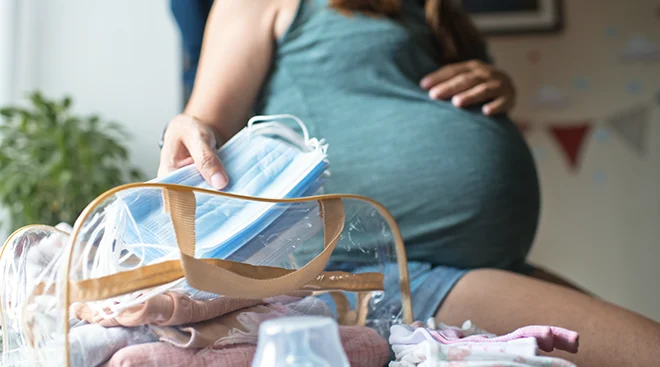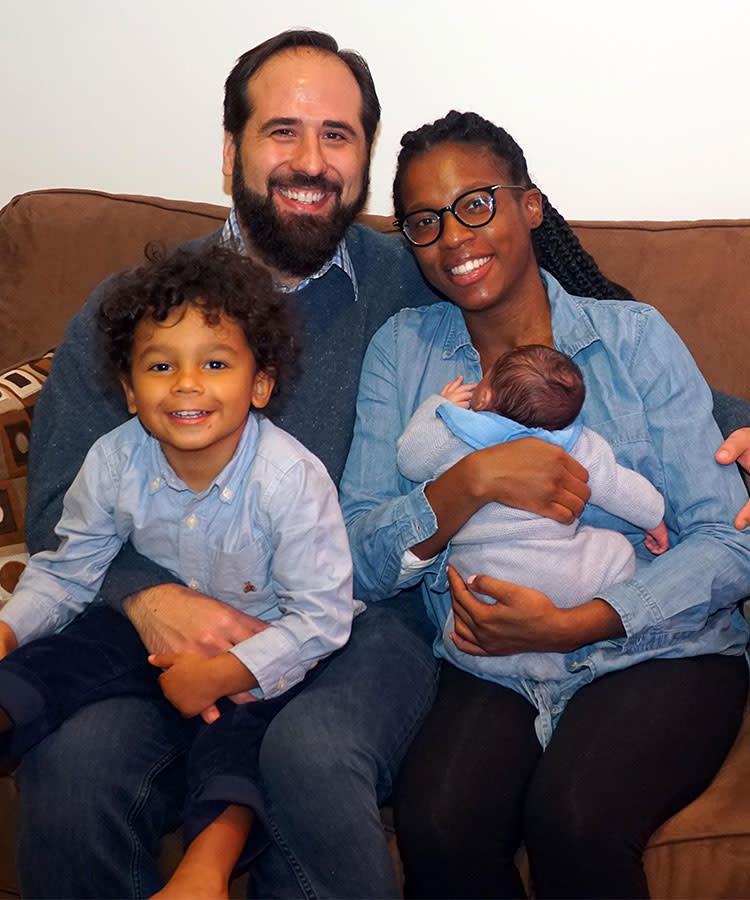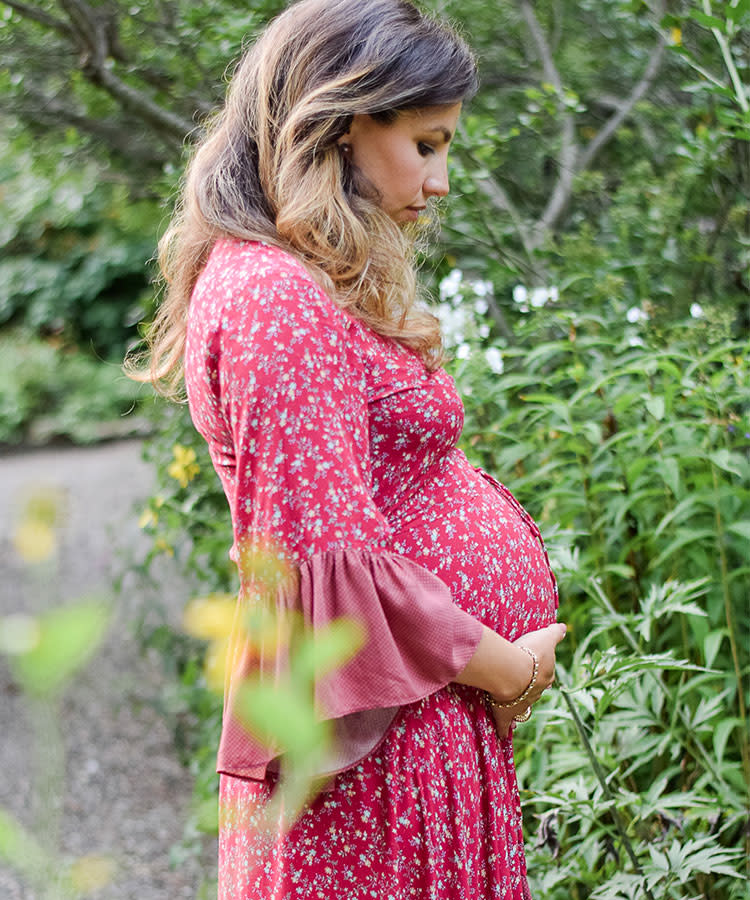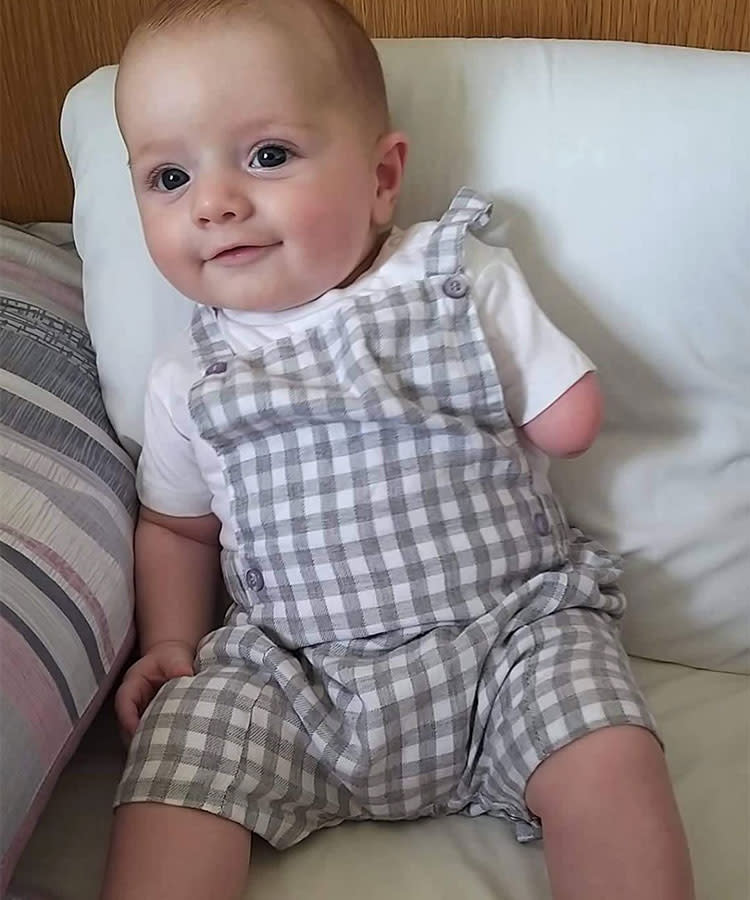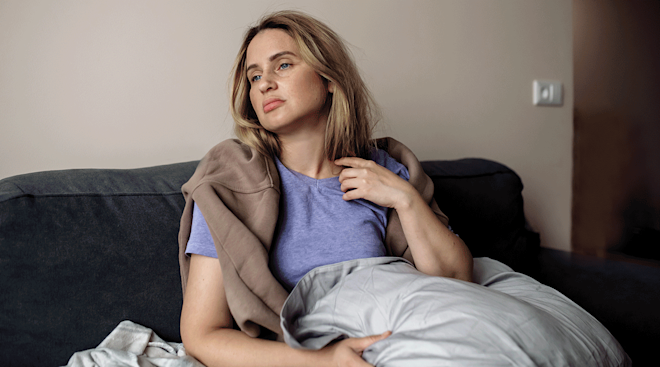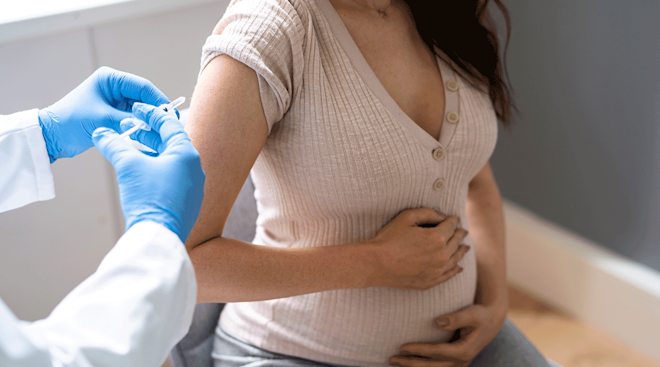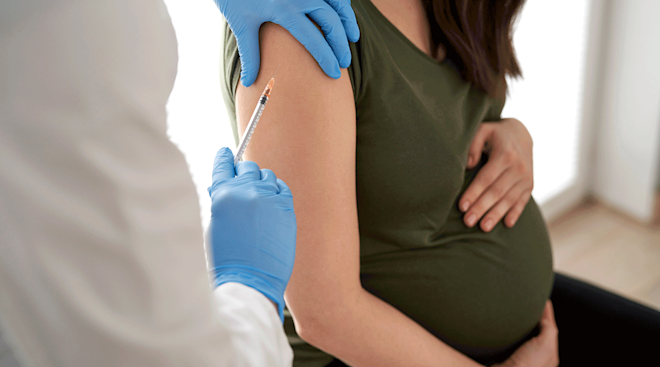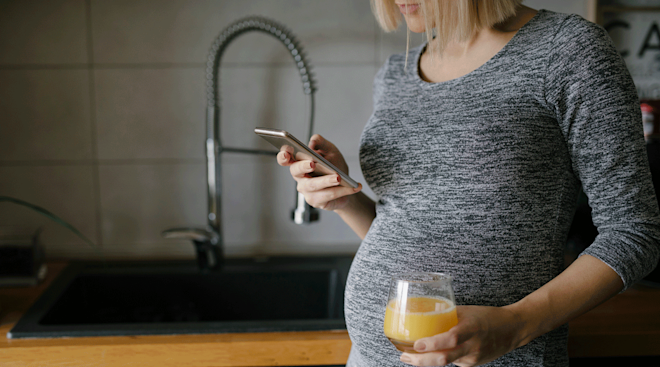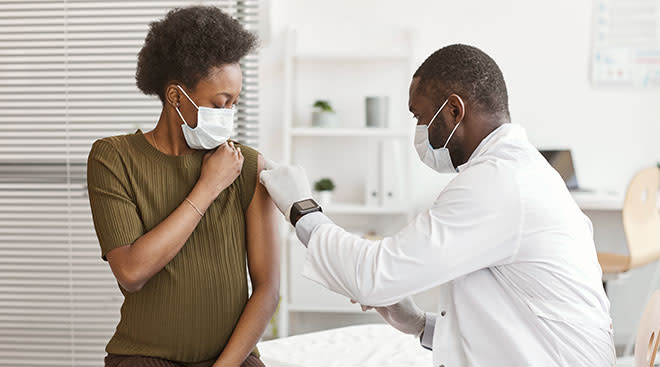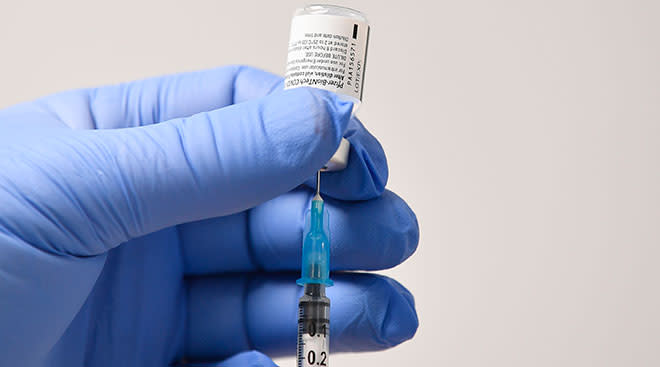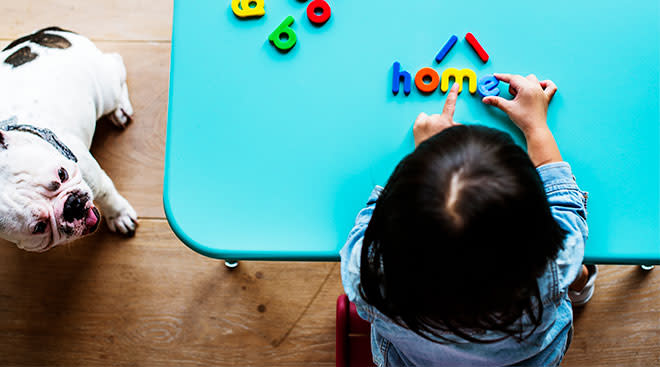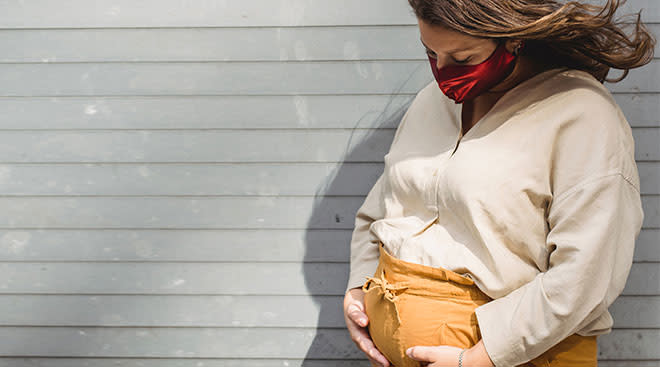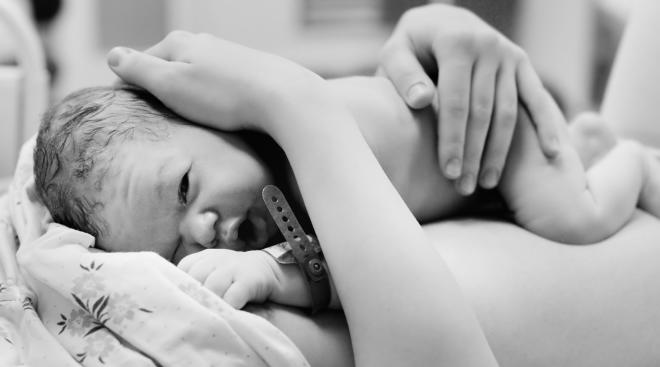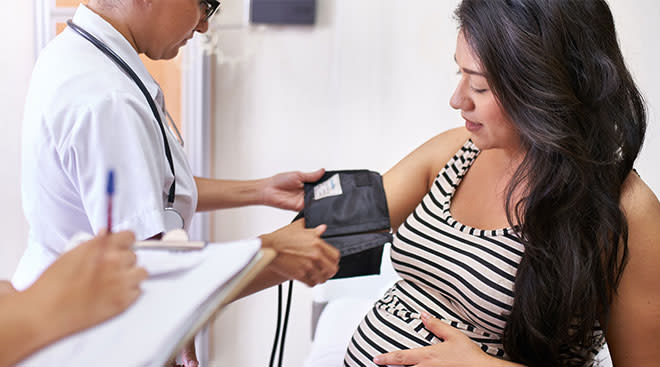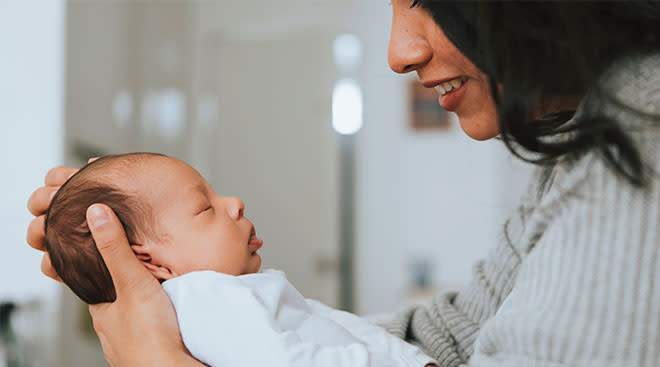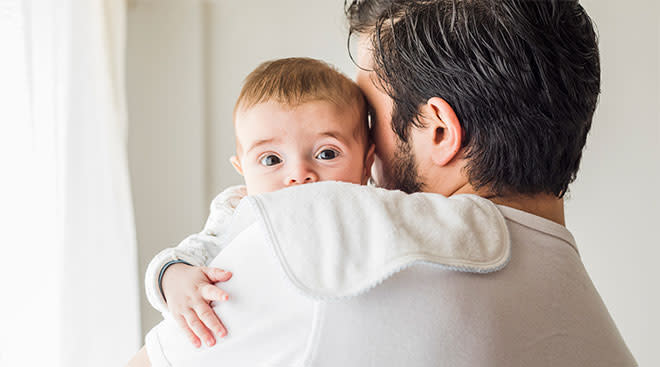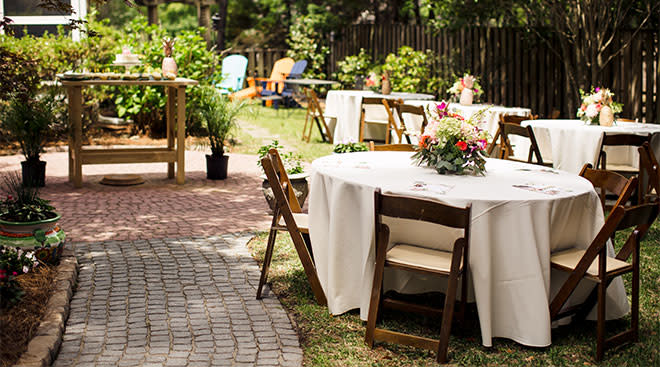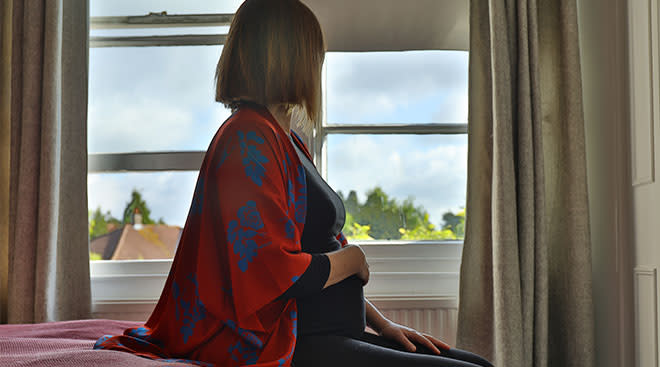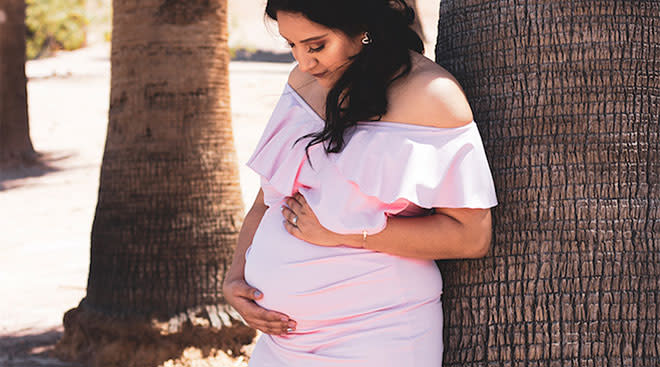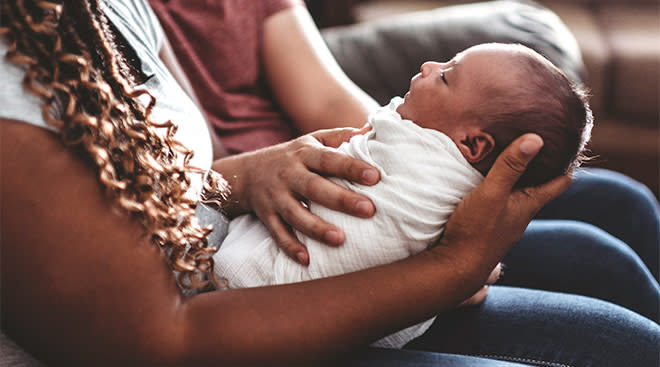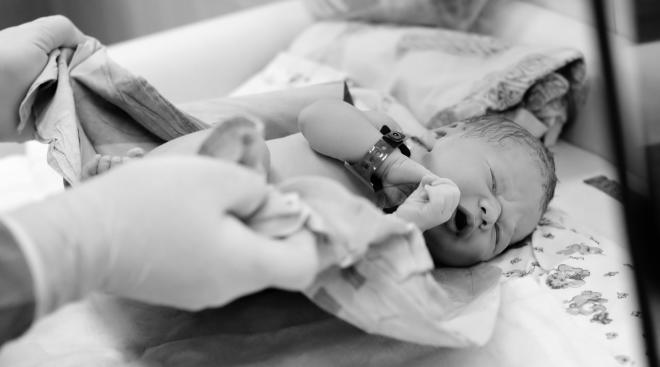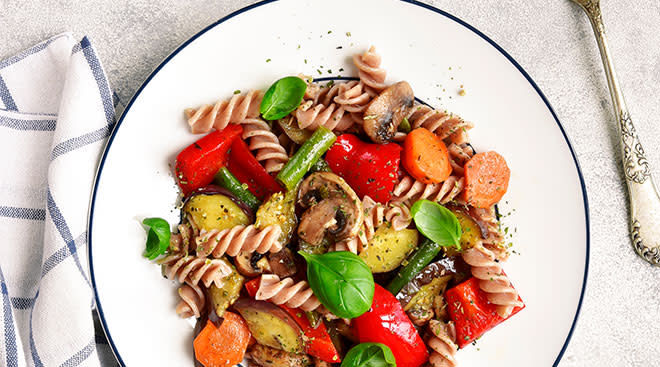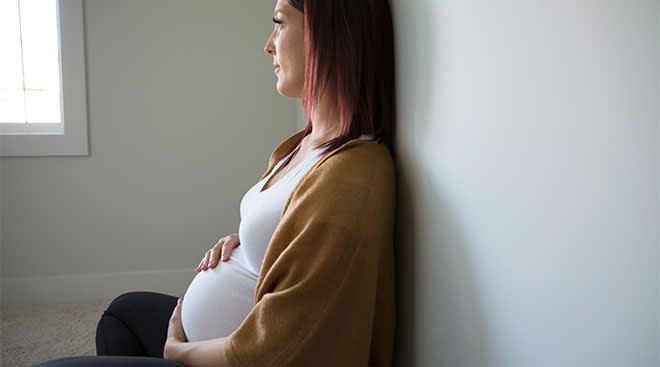Moms Share Stories of Being Pregnant and Giving Birth in a Pandemic
I found out I was pregnant with my second child in March of 2020, two weeks into the COVID-19 lockdown—and mere days after my husband and I decided to stop trying for a baby until the pandemic had passed, never guessing it would last longer than a couple months. (Too late!) What ensued was the hardest year of my life.
We didn’t have childcare for 10 months. Trying to watch my toddler while working from home, all while pregnant, was exhausting. Not having my husband beside me at any of my prenatal appointments, especially when I developed complications late in pregnancy, was stressful. Feeling the typical isolation of the newborn period compounded with the imposed isolation of COVID was depressing.
And yet, in certain ways, the pandemic gave me unprecedented freedom. I spent four months working from the porch of my father-in-law’s rural Vermont home. I took my daughter to feed the neighboring horses and go kayaking on the lake. I gave up my daily subway commute and spent the vast majority of my pregnancy in leggings. (Seriously, major bonus.) And it made me appreciate more than ever how vital a support network is—because as much as I proved my resilience and capacity, it truly does take a village.
I’m certainly not alone in this. Countless women have become pregnant or have given birth during the pandemic, each with their own experiences of the emotional, physical, mental and logistical challenges—as well as unexpected gifts—of being an expectant or new mom in these crazy times. Here are some of their stories.
The week leading up to my induction date, I remember being on the phone with my dad saying, “There’s no way they’ll not allow partners in the delivery room… they can’t do that, right?” I felt a sense of calm, thinking that although the world around me felt so out of control, there was just no way it could go that far. And then, two days before I was scheduled to get induced, it did.
I saw the news and just cried. I was nervous enough to go through childbirth for the first time during a pandemic, but then to be told I had to be dropped off at the hospital lobby to have our baby alone was beyond overwhelming.
Everyone tried to comfort me. My mom reminded me that not long ago, partners stayed in the waiting room while their babies were born. I kept reminding myself that it was just a point in time, a few days from induction to birth to being back home again. It was temporary discomfort and would all be over soon, and the only way through it was to stay calm and use the information to make the best new plan possible.
As my husband drove me to the hospital, I vividly remember feeling so empty. In Manhattan, even at midnight, there are normally cars and people out. But this night, there was nothing. It was eerily quiet and reflective, which made the experience feel even lonelier.
I think I was most unprepared for having to make every little decision and digest every piece of information completely alone. My husband, Matt, tried to stay awake to keep me company via FaceTime once he was back home, but my induction was scheduled for 1 a.m. and at some point he fell asleep (can’t blame him!).
The almost 36 hours from induction to birth feel like such a blur. I didn’t realize how infrequently nurses check on you when you’re just waiting for the induction to start moving along—it was long and lonely, and little things like getting something from my bag were impossible without help. Around 2 a.m. the next night, after being at the hospital for over 24 hours and unable to get comfortable enough to sleep, I just sat in my room alone and cried.
Afterwards, friends and family asked if the nurses were more helpful and supportive because of COVID. The answer is no, but I don’t blame them. This was the end of March, and they’d been thrown into this situation as quickly and terrifyingly as everyone else. They also had an entire floor of women in labor without their partners or birth plans. I can’t imagine how stressful it must have been for them too.
I pushed for three hours and honestly think the emotional toll of not having my husband or a consistent support team by my side contributed to the length. I was physically and emotionally exhausted.
Because of COVID, new moms who delivered vaginally only stayed in the hospital for 24 hours. My daughter, Gemma, was born at 3 p.m. and I was out the door the next day at 4 p.m., whether I was ready or not. Then came the very vivid moment as I turned the corner out of the elevator with a new baby and saw my husband standing in the lobby. I felt like I was getting off a plane at the airport and he should have been holding a sign with my name on it. He hugged me tightly and I pulled away because my emotions were running so high and I didn’t want to start crying uncontrollably (in hindsight, who cares?).
The first two weeks of Gemma’s life, I cried every afternoon. I missed my family and friends and wanted Gemma’s grandparents to come over to meet and hold her. Matt and I desperately needed a break, but it was too early in the pandemic and we were all in quarantine, so it wasn’t possible.
The first year of Gemma’s life was so far from what I expected. It makes me sad that she still hasn’t met some of her family. But when I stop and think about those vivid moments that bookmarked the year, and about our family and friends who sent us so much support and love from afar all year long, I’m beyond grateful for all of it. We’re all happy and healthy—and that’s really all I can ask for.
Bevin Wheeler is mom to a one-year-old girl and lives in Brooklyn, New York, with her husband.
We had been living in “COVID times” for six months when I got pregnant for the second time. Despite a fair amount of stress related to limited/no childcare, buying and selling a house and the general anxiety of living through a pandemic, I was feeling very positive. Our close family and friends were healthy, we had a beautiful new house and had an easy time getting pregnant with our second child. But I mourned not being able to hold my husband’s hand as I “saw” our new child for the first time on ultrasound, and instead witnessed that strange, miraculous moment alone.
Around Thanksgiving, we started to feel COVID “getting closer.” More friends and family members were positive, and my mom lost a dear friend suddenly to COVID. As it crept closer and closer, my anxiety started to rise. On December 7, my 2-year-old son’s school closed due to multiple cases in multiple classrooms (but not in his). On December 14, my husband woke up with a high fever, and that same day we learned there had in fact been a case in my son’s classroom. On December 16 my husband received his positive COVID result, and I just broke down crying. It was a debilitating combination of fear and significant guilt: We had been so careful, and here we were, the week before Christmas, dealing with a nightmare. There were so many unknowns.
My son and I got our positive test results a week later on December 23, after I started developing symptoms. (I knew it was inevitable when I was changing a very dirty diaper and didn’t smell a thing). Our go with COVID was rough.
When all was said and done, we had lived a month fully quarantined with no childcare, where one or both of us was severely ill, trying to keep things “normal” for our active toddler and still give him a magical Christmas. And oh yeah, keep up with our work.
As tough as it was, ultimately I feel so fortunate: fortunate that our disease course was not more severe, fortunate that our son didn’t get sick, fortunate that my pregnancy continues to be healthy, fortunate that we had the access and means to get all of our basic needs met and then some, fortunate for our dear family and friends who provided support in every possible way, but most of all, fortunate and grateful for whatever immunity we now have against this terrible disease. (I’m also scheduled to receive my vaccine in three days!)
As I enter my third trimester, I’m trying to focus on my feelings of hope as opposed to the ever-present loneliness and anxiety that are constantly in the background. Yes, we will still need to navigate a very different world with our newborn daughter from the one into which we brought our son, but I find peace in knowing that my antibodies are circulating through her teeny veins.
Emily Dalton is a soon-to-be mama of two and lives in Hingham, Massachusetts, with her husband and toddler son.
Being pregnant during the pandemic, all I kept saying to myself was, “thank goodness this isn’t my first pregnancy!” When I was pregnant with my first son, I was nervous every step of the way, not knowing what to expect. I was thankful to have my husband accompany me during every doctor’s visit and ultrasound. We both shared in the joy of hearing our first son’s heartbeat and watching him grow in utero.
I found out I was pregnant with our second child in March 2020, during the height of the pandemic in New York City. I was afraid and extremely nervous because not much information was floating around on the virus or how to keep safe from it in those early days of the pandemic. Worrying about becoming infected and passing it onto the baby was emotionally draining, to say the least.
During my second pregnancy, my husband couldn’t accompany me to any of my doctor appointments. He wasn’t there to hold my hand, hear our second son’s heartbeat or get a glimpse of him from the ultrasound. I had to relay all my excitement, nervousness and hopes to my husband after each visit.
The waiting room at the maternity clinic was empty, and if you did see another mom, you were kept 6 feet apart. You didn’t speak with other moms because of the fear of transmitting the virus, even when wearing a mask.
Another big challenge of being pregnant during the pandemic was trying to parent during extreme bouts of morning sickness. The first couple of months, I leaned on my husband a lot for parenting our son. I felt guilty at first, but watching my husband and son’s bond blossom was extremely rewarding. I was able to focus on remaining healthy and resting when possible. I’m thankful my husband was able to step up and help even more so during the pandemic.
When New York issued guidance banning the presence of a support person during labor and delivery, I was devastated and anguished. I couldn’t fathom my husband not being there to support me while giving birth. Even more so as a Black woman (who developed preeclampsia towards the end of my first pregnancy), the thought of not having my husband present during labor and delivery gave me intense anxiety. You hear so many horror stories about Black women, regardless of socio-economic status, dying during or immediately after childbirth. Studies show having a spouse or support person present lowers the risk of maternal death. Luckily, due to backlash from moms and other support groups, New York quickly got rid of that guidance.
Living in New York City, we had to navigate constantly being home in our small railroad-style apartment. Before the pandemic, we didn’t think about space much. However, when we had to spend most of our time at home, it became clearer that we needed a bigger place. Additionally, we didn’t know whether daycares would reopen or what childcare would look like for our new baby in the conceivable future. My mother-in-law offered to help with childcare, but my in-laws lived in a different state. As a native New Yorker, it was hard to think about uprooting my family, but without knowing how long the virus would continue to wreak havoc and disrupt everyday life, we decided it was best to put our family’s needs first.
Last fall, we found a place near my in-laws. Now the boys have their own rooms and a backyard to play in. My mother-in-law comes to our place every day for several hours to help with childcare, while my husband and I continue to work remotely. It’s been a huge help having consistent childcare—otherwise, I probably would have had to scale back my career, which I don’t want to do!
The silver lining for me and my family was realizing early on how lucky we were during this entire ordeal. We’ve heard and seen so many unfortunate stories about people dying from the virus, losing their homes or having to show up for work with little to no personal protective equipment. I’ve always tried to live life as empathetically as possible, and even more so now.
Sade Cohen is a mom of two little boys and lives with her husband and sons.
My pregnancy looked nothing like how I had envisioned it, and getting pregnant was not a simple task for us. It came with an incredible amount of intention, financial investment and patience. My wife went through six rounds of IUI unsuccessfully before I began the fertility process, just as the world was shutting down due to COVID. When I got pregnant in May 2020 with twin baby girls, I was of course elated—but also acutely aware that the months ahead would be challenged with massive uncertainty and isolation. And so began nine months of both grieving expectations and relishing in silver linings.
Sheltering in place meant the day-to-day hoopla around this pregnancy would be sparse. There would be no baby shower in the backyard, no dinners out with friends talking about becoming a parent or going to movies and parties kid-free. When I got married, I loved the wedding showers, the event planning, the gathering of my people to help usher me into this new chapter. I remember thinking the next and maybe only similar time would be when I got pregnant. I hadn’t fully realized it until it was lost, but I was so looking forward to gathering as a way to help transition into this massive identity shift.
I missed out on a babymoon with my wife. We would have loved to jet off to Hawaii on one last adults-only vacation. Being forced to stay put as the clock was counting down on our baby-free life felt so unfair. And, quite unexpectedly, it was pretty painful not being able to show off my growing belly to my closest loved ones. There is value in simply bearing witness to someone’s experience and I felt the loss of not having that.
There were many missed moments worth grieving, and it’s easy to harp on them—but the truth is, I know how fortunate I was during my pregnancy. While I didn’t get to have a baby shower IRL, I did have some epic virtual showers, which made it possible to include friends and family from all across the country in this celebration. Certainly, the pandemic gave me some gifts I would have never given myself. Work-related travel was paused, so I was able to nurture my body with rest in a way I truly never could before. Days were marked with delicious meals cooked by my wife or takeout from our favorite restaurants. Instead of workout classes and wine dates with friends we went on long walks, exploring our neighborhoods and making it from our house to the beach—something I’d always wanted to do but never made time for. I leaned into the support of seeing my mom often. I certainly would have done less of that during my pregnancy if we didn’t need to make a small pod and stick to it. I felt strong and beautiful as a pregnant woman, and I’m sure much of this was due to the slower pace of simpler days. I wasn’t spread thin and I loved it.
Upon reflection, I think the silver linings outweigh the loss. There is something rare and precious about having to slow down and live with a more narrow focus. Not only was this healthy for my technically “high-risk” pregnancy, but also great training for these early months of motherhood. Maybe, most significantly, was that while we didn’t get to go on a babymoon, my wife and I got to be together for my entire pregnancy, navigating the very tumultuous reality that was 2020. We built an even stronger foundation in our marriage, which has been incredibly supportive now that we are new mamas.
Rachael Caine is a mom of twin baby girls and lives with her wife in Los Angeles, California.
My first pregnancy was ideal. I had picked a doctor only a few blocks away from my office. Even though the commute was challenging in the first trimester, I loved going to work every day and being able to share the wonder and craziness of my first pregnancy with my mostly female co-workers who were also close friends. In my second trimester, my husband and I traveled to Italy with my sister and her husband for 10 days, where I showed off my 5-month bump in tiny string bikinis. Later on, my husband and I went on a babymoon to Hawaii for four days. Because my daughter, Uma, is the first baby in our family, I had multiple baby showers: one with my parents in Florida that adhered to Indian traditions, one with my friends in New York on my birthday and a third one at work. Every flutter and kick, every doctor’s appointment, every weird sensation was new and full of anticipation, made better by being able to share it with friends and family. I gave birth to Uma in December 2019, right before COVID hit America and everything changed.
I got pregnant for the second time in June, four months into the pandemic. And the experience has been much different than my first. I went on maternity leave in December 2019 after my daughter’s birth, and I’ve been home ever since. My office started working from home in March due to COVID, so even when I returned to work in April, it was from home.
The biggest challenge of this pregnancy has been going through it while being cooped up at home alone while working and taking care of a small baby. As my husband is still going to work, he’s gone from around 5:30 a.m. to 4 p.m. While I was on maternity leave, and even when I started working from home in April, it was manageable for me to take care of Uma’s feedings, changes and naps while working since she wasn’t yet moving around. But when I got pregnant again at the end of June, all of those things became harder.
My first trimester nausea and food aversions were back in full force, and with them also came the numbing fatigue. It started getting harder to manage everything alone. There were days that I couldn’t get myself to eat anything. It got even harder as I started getting bigger and Uma started crawling and walking and demanding more of my attention. Client phone calls and especially video calls became almost impossible. We had set up daycare for her thinking I’d be able to go back to the office at the end of my maternity leave, but because of the pandemic, they were shut down from March to June. Also because of COVID, I didn’t feel comfortable hiring any sort of outside help to come and take care of her at home. I found myself being resentful of my husband for being able to leave the apartment and have some semblance of a life, albeit a limited life, outside of me and Uma, and I began looking to pick fights for petty reasons. Things improved when we finally took steps to enroll her in daycare at the beginning of January 2021.
I don’t want to make it seem like the whole experience was entirely negative. Not many working moms are lucky enough to get to spend their baby’s entire first year with them. I was able to experience all of Uma’s milestones in real time, and it was the most amazing feeling knowing that there was nothing about her that I didn’t know or had missed out on. Now that I’m at the end of my second pregnancy (I’m due in three days, and it’s a boy!), the hardships of the past year seem like a distant memory. I’m incredibly nervous about what the next year will look like for us with two little kids so close in age demanding our attention, but I am excited at the thought of not having every single prospect of our life dominated by COVID.
Neha Jambhekar is a soon-to-be mom of two and lives in Queens, New York with her one-year-old daughter and husband.
It took about a year and a half of “trying” before our second round of IUI was successful. My husband and I learned we were finally pregnant on Valentine’s Day of 2020! But a couple of months into pregnancy, everything changed for us.
At the time, although I was based in the US, I was working for a fashion company headquartered in China, so I was familiar with how the coronavirus had affected my teammates and our business in Asia. By spring, all of our clients had canceled their orders, and just as my first trimester was coming to an end, I was laid off from my job.
I had spent my whole life wondering what it would feel like to be pregnant, to have people hold doors, give up their seat on the train for me and have my friends and family watch my baby bump grow. Suddenly none of that was going to happen.
Our little boy was born in early October, and for all the daydreaming, reading and planning in the world, nothing can prepare you for what it feels like to become a mother. I had heard that breastfeeding was challenging but for the life of me couldn’t understand why—it looked like the most natural thing in the world. I knew I’d be exhausted. I knew my body wouldn’t bounce back like a celebrity’s. Well, soon after my son arrived, I realized how many new moms feel. On one hand, I was completely head-over-heels in love with this miracle I created and so proud of myself for birthing him. And on the other hand, I realized it was time to mourn the loss of the woman I once was.
COVID has stolen so much from all of us at this point. I’m one of the lucky ones who hasn’t lost a friend or family member to this dreadful virus. But all the things it did steal from me only amplified the grief and isolation I experienced while going through such a drastic life change. Pre-pregnancy and pre-COVID, I had an active social life, a VP title and I traveled internationally for work and pleasure on the regular. I had an active studio yoga practice, a 27-inch waistline, a great wardrobe that actually fit and I did my hair and makeup and accessorized on a daily basis.
Today, I change from day pajamas to night pajamas. I wash my hair once a week and breastfeed six times a day. Most of my waking hours are spent singing about whatever mundane activity I’m doing with my infant. I don’t recognize my reflection in the mirror. That sounds cliché as I write this, but honestly, I have stopped in total bewilderment as I stare into the mirror and catch myself thinking, “who is that?” I’m still carrying an extra 30 lbs of weight on me and have gotten my hair cut only once in the past year. I don’t look anything like the “old me” and don’t feel comfortable in my own skin.
But I’m feeding another person with my body, and I’m so proud of that. I might not be happy with my appearance, but my body is doing an all-star job at sustaining another life postpartum. And for all the seemingly superficial things I listed above that I’ve “lost,” I also recognize that this is a season of my life. Just as this COVID lifestyle is temporary, this period of time won’t define me as a woman forever.
My mom lives across the country and never saw me pregnant or touched my belly. Things like that have made me shed a tear or two over the past year. But all in all, I bet I’ll look back at this time as the happiest of my life. Being unemployed while pregnant gave me the opportunity to take walks and nap whenever the mood struck. I felt every baby kick and noticed every symptom because I was fully present and self-aware. If I was working, things surely would have been different. I can confidently say I squeezed every ounce of experience out of this pregnancy and lived it to the fullest.
Joanne Santaniello is mom to a baby boy and lives in West Orange, New Jersey, with her husband.
My husband Joe and I found out I was pregnant with our first baby in September 2019, due in May 2020. All was great and exciting at the start as I had a straightforward pregnancy and Joe was able to come to all the appointments with me—that is, until March, when the pandemic struck.
On the day that we heard schools were to shut and we would be entering a lockdown, I had just finished up my second prenatal class. I remember listening to the news that day, shocked and fearful for what was to come. Prenatal classes were cancelled and nothing had been arranged for online classes at such short notice. But going to the doctor appointments by myself was fine; I didn’t have any complications, so there was nothing to worry about. On the positive side, the waiting times were less.
Our baby Luke was breech and therefore I had to have a scheduled c-section. But the evening before, I started having contractions. I rang my mum, worried, since I knew I couldn’t have a virginal birth. I went into the hospital at 11 p.m. Joe was allowed in with me and had to wait outside the room while I was being examined. True enough, I was in labor and 2 cm dilated. I was then whisked away on my own to the operating room. Luke was born at 1:30 a.m. and I was thrilled—until the midwife brought him over to me after being examined and said, “your baby boy is perfect but has a defect to his left arm.” She pulled the towel down to show me that his arm had stopped growing past the elbow.
As the tears ran down my face (I was unable to wipe them away as my arm were stretched out and hooked up to machines), my thoughts ran to Joe. What will he think? Will he be okay when he sees the arm? I took a breath, said to myself it will be okay and asked the midwife to bring the baby to Joe.
When I was able to join them, Joe was cradling Luke, and as we looked at each other our eyes welled up. From behind our masks we both whispered, “it will be okay.” It was another two hours before we had the room to ourselves and Joe and I had a chance to hug, cry and reassure each other. We knew we had to ring our families and tell them the news. Not having my mum there was heartbreaking, as all I wanted was her to hug me and say it will be okay. Trying to word how I was going to tell them about Luke’s arm and say it out loud for the first time was very tough.
Fortunately, the midwives were amazing and allowed Joe to stay until the pediatric doctor came to see us. As the defect wasn’t picked up on any prenatal scans, it was obviously a major shock to us. Then the doctor started using words like “disability,” “genetics” and “prosthetics,” which hit us like a ton of bricks. An hour later, Joe was asked to leave, and we didn’t see him until three days later.
When we got home it was lovely to be on our own in our new family bubble and get into a routine—but it was depressing that we couldn’t see anyone or show Luke off to our friends and family to celebrate.
Being so far from home and my mum was very tough, and still is. Luke is nearly one, and my parents have only met him a handful of times. We had planned that my mum and sisters would stay with us for the first weeks to give support and guidance, particularly for breastfeeding, but this obviously didn’t happen. Almost a year on, Luke hasn’t met another baby, hasn’t met the majority of his relations, hasn’t been to the swimming pool or indoor play centers and has only been to the park twice—all minor things, but not what we thought the first year of his life would be like. Still, Luke is thriving, and someday hopefully soon he will start to experience a normal childhood. He is also going to be fitted for his first prosthetic arm in a few months.
Gemma Hehir is mom to a baby boy and lives in Donegal, Ireland, with her husband.
At nine weeks pregnant, my husband and I arrived at my ob-gyn’s office for my first prenatal visit. We were promptly told that my husband couldn’t attend my appointment or any of my future appointments, for that matter. At that moment, it truly sunk in that this pregnancy wouldn’t quite be like my first. With a toddler running around the house and us continuing to work full-time from home in our makeshift “offices” (a small side room for my husband and the kitchen for myself), balancing all of this in the midst of the pandemic has left us feeling unsteady and exhausted.
However, besides attending my ultrasounds alone (I’m able to FaceTime my husband during them, but it’s not the same), there have been a few silver linings that I didn’t anticipate. First, I don’t have to commute while pregnant, which is a big plus in my book. We lived in Brooklyn during my first pregnancy and I loathed riding the subway while pregnant, fearful that I would get poked and prodded by my fellow commuters. Second, on days when my symptoms are really taking their toll (my nausea and fatigue during my first trimester were much more acute this time around), I can just take a break and go lay on our couch. Lastly, I don’t have to wear pants! I’m still working on purchasing enough maternity pants and shorts to get me through this pregnancy, but at least none of my colleagues can see that I’m pantless during our Zoom meetings.
Kristina Razon is an expectant mom of two. She lives in Hudson Valley, New York, with her husband and toddler.
This is my second pregnancy, and my due date for baby #2 is two years and three days after my daughter’s birthday. Putting COVID aside, I’d say the second time around I’ve been much more relaxed throughout the pregnancy: less concerned about every little feeling, not obsessing over which things I should and shouldn’t eat, and much less anxious about bringing a new life into the world. There were often times, especially early on, that I forgot I was pregnant and just carried on with my day without an omnipresent thought of baby.
The impact of COVID on the pregnancy, however, has been significant and far-reaching. Our family relocated from New York City to rural northwestern Connecticut—only 70 miles away but a world apart. Up here, food delivery is not an option. The plethora of mommy and me activities that were available to me during my first pregnancy were nonexistent the second time around. Here we have all the social distancing we need, and the social isolation that goes along with that.
Not being able to see friends and family has been extremely challenging during this pregnancy. Zoom and FaceTime is an unsatisfying substitute. When I was pregnant with my first, I would often discuss shared experiences with friends and acquaintances who were going through their own pregnancies or had small children, chatting at birthday parties or park playdates and gleaning recommendations and insights that often proved helpful. Those opportunities for casual, face-to-face interactions were just not there this time around. As a result, I often felt alone, that I was missing out on the joys of sharing an exciting experience with loved ones, and confused in the face of the complications imposed by the pandemic.
Silver linings? Yes, there are a lot of those. I’ve been able to spend a lot more time with my daughter than I would have had we not worked from home. The pandemic forced our business to adapt and evolve, much more rapidly than it ever would have happened in a pre-COVID world. And most significantly, my priorities have shifted. Problems that felt earth-shattering in 2019 have faded into the background as the health and mental wellbeing of my family has taken center stage. We’re lucky—we have a comfortable and safe home. No one in my family lost their lives because of COVID. We are coming out of the pandemic stronger than we were going into it, and we are celebrating the creation of a new life.
Jessica Pleasants is an expectant mom of two and lives in Kent, Connecticut, with her husband and 2-year-old daughter.
Please note: The Bump and the materials and information it contains are not intended to, and do not constitute, medical or other health advice or diagnosis and should not be used as such. You should always consult with a qualified physician or health professional about your specific circumstances.
Navigate forward to interact with the calendar and select a date. Press the question mark key to get the keyboard shortcuts for changing dates.

































